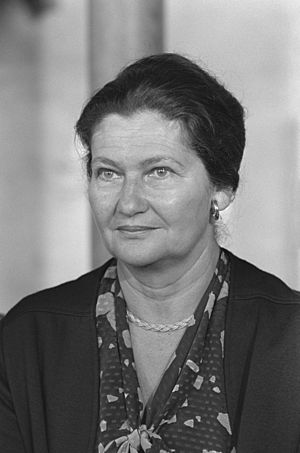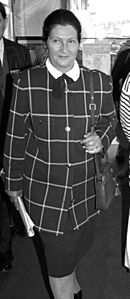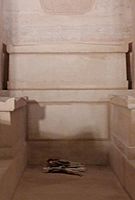Simone Veil facts for kids
Quick facts for kids
Simone Veil
|
|
|---|---|

Veil in 1984
|
|
| Member of the Constitutional Council | |
| In office 3 March 1998 – 3 March 2007 |
|
| Appointed by | René Monory |
| President | Roland Dumas Yves Guéna Pierre Mazeaud |
| Preceded by | Jean Cabannes |
| Succeeded by | Renaud Denoix de Saint Marc |
| Minister for Social Affairs, Health and Urban Issues | |
| In office 30 March 1993 – 11 May 1995 |
|
| President | François Mitterrand |
| Prime Minister | Édouard Balladur |
| Deputy | Philippe Douste-Blazy |
| Preceded by | Bernard Kouchner |
| Succeeded by | Élisabeth Hubert |
| President of the European Parliament | |
| In office 17 July 1979 – 18 January 1982 |
|
| Preceded by | Emilio Colombo |
| Succeeded by | Piet Dankert |
| Member of the European Parliament for France |
|
| In office 17 July 1979 – 30 March 1993 |
|
| Preceded by | Constituency established |
| Succeeded by | Jean-Marie Vanlerenberghe |
| Minister of Health | |
| In office 28 May 1974 – 4 July 1979 |
|
| President | Valéry Giscard d'Estaing |
| Prime Minister | Jacques Chirac Raymond Barre |
| Preceded by | Michel Poniatowski |
| Succeeded by | Jacques Barrot |
| Personal details | |
| Born |
Simone Annie Jacob
13 July 1927 Nice, France |
| Died | 30 June 2017 (aged 89) Paris, France |
| Resting place | Panthéon |
| Political party | UDF (1979) UDF (1995–1997) UDI (2012–2017) |
| Spouse |
Antoine Veil
(m. 1946; died 2013) |
| Children | Pierre François Veil Jean Veil Claude-Nicolas Veil |
| Alma mater | ENM Sciences Po University of Paris |
Simone Veil (born Simone Jacob; 13 July 1927 – 30 June 2017) was an important French magistrate (a type of judge) and politician. She served as Health Minister in France many times. From 1979 to 1982, she was the first woman to be President of the European Parliament.
As Health Minister, Simone Veil is best known for helping to improve women's rights in France. She survived the Holocaust, having been held in both Auschwitz-Birkenau and Bergen-Belsen concentration camps. Because of her experiences, she strongly believed that European integration (countries working together) was the best way to keep peace.
Simone Veil received many awards for her work. She was made an honorary dame in the Order of the British Empire in 1998. In 2008, she was elected to the Académie Française, a famous French institution. In 2012, she received the highest French award, the Légion d’honneur. Simone Veil is considered one of France's most respected figures. She and her husband were buried in the Panthéon in Paris on 1 July 2018, a special place for national heroes.
Contents
Early Life and Family History
Simone Jacob was born in Nice, France, on 13 July 1927. She grew up in a Jewish family that did not practice religion. Her father, André Jacob, was a talented architect. Her mother, Yvonne Steinmetz, had to stop her chemistry studies when she married.
The family moved from Paris to Nice in 1924. Simone was the youngest of four children. Her older siblings were Madeleine, Denise, and Jean. Simone's family was proud of their Jewish heritage. Simone wrote in her autobiography that her father believed Jewish people were "the people of the Book, the people of thinking and writing."
Surviving the Holocaust
When Germany invaded France in June 1940, the family tried to stay safe. Nice was under Italian control, which helped them avoid being sent away at first. Simone had to study at home. As the arrests of Jewish people increased, her family split up. They lived with friends using fake names. Her sister Denise joined the French Resistance.
In March 1944, 16-year-old Simone took her high school exam (baccalaureate) using her real name. The very next day, she was arrested by the Gestapo. Her entire family was also rounded up that same day.
On 7 April 1944, Simone, her mother, and her sisters were sent to a camp called Drancy. Then, on 13 April, they were sent to Auschwitz. Simone’s father and brother were sent to the Baltic states and were never seen again. Her sister Denise was sent to another camp, Ravensbrück concentration camp, but she survived.
Simone arrived at Auschwitz on 15 April 1944. She later said she lied about her age to avoid immediate death. She was registered for the labor camp. In January 1945, Simone, her mother, and sister were forced to march to Bergen-Belsen concentration camp. Sadly, her mother died there from typhus. Madeleine also became ill but survived, like Simone, when the camp was freed on 15 April 1945.
Life After the War
After the war, Simone Jacob returned to France. She began studying law at the University of Paris and then at Sciences Po. There, she met Antoine Veil. They married on 26 October 1946. They had three sons: Jean, Nicolas, and Pierre-François.
In 1952, Simone's sister Madeleine died in a car accident. In 1956, Simone decided to become a magistrate. She passed the national exam to achieve this.
Political Career and Public Service
After becoming a magistrate, Simone Veil worked for the Ministry of Justice. She worked to improve conditions in women's prisons. She also worked to improve the rights of French women in general. She helped women gain the right to share control of family legal matters with their husbands. She also helped women gain adoption rights. In 1970, she became a top official in the Supreme Magistracy Council.
Minister of Health (1974–1979)
From 1974 to 1979, Simone Veil served as the Minister of Health under different prime ministers. During this time, she worked on important health issues. In 1976, she helped introduce a ban on smoking in some public places. She also worked to help rural areas that did not have enough doctors.
Leading the European Parliament (1979–1993)
In 1979, Simone Veil was elected as a Member of the European Parliament (MEP). This was the first time people directly voted for members of the European Parliament. In its first meeting, the new Parliament chose Simone Veil as its first President. She held this important role until 1982.
In 1981, she received the Charlemagne Prize. This award honors people who help bring European countries closer together. After her term as President, she remained an MEP until 1993. She continued to work on committees related to the environment, public health, and foreign affairs.
Return to French Government (1993–1995)
From 1993 to 1995, Simone Veil returned to the French government. She served as Minister of State and again as Minister of Health. During this time, she focused on helping people with disabilities and those with HIV/AIDS. She also worked to support mothers with young children.
Constitutional Council Member (1998)
In 1998, Simone Veil was appointed to the Constitutional Council of France. This is France's highest legal authority. In 2005, she took a short break from the council to support the idea of a new European Constitution. She believed it was important for people to understand the historical importance of European integration.
Later Life and Legacy
In 2008, Simone Veil became the sixth woman to be elected to the Académie Française. This is a very respected institution in France. On her special sword, given to all members, her Auschwitz number (78651) was engraved. Also engraved were the mottos of France ("liberty, equality, fraternity") and the European Union ("Unity in diversity").
Simone Veil passed away at home on 30 June 2017, just before her 90th birthday. On 5 July 2017, she was honored with a national ceremony in Paris. President Emmanuel Macron announced that she and her husband would be reburied in the Panthéon. This special honor happened on 1 July 2018.
Honors and Awards
Simone Veil received many honors and awards throughout her life for her dedication to public service and human rights.
National Honors
- Grand Cross of the Legion of Honour (2012)
- Knight of the Ordre National du Mérite (2001)
Foreign Honors
 Germany: Knight Commander of the Order of Merit of the Federal Republic of Germany (1975)
Germany: Knight Commander of the Order of Merit of the Federal Republic of Germany (1975) United Kingdom: Dame Commander of the Order of the British Empire (1998)
United Kingdom: Dame Commander of the Order of the British Empire (1998)- And many other honors from countries like Brazil, Cameroon, Latvia, and Portugal.
Awards
- In 2005, she received the Prince of Asturias Award for International Cooperation.
- In 2007, she was awarded the North-South Prize of the Council of Europe.
- In 2008, she won the Charles V Prize for her work in advancing women's equality.
- In 2018, a special €2 commemorative coin was made in her honor, featuring her deportation number.
Honorary Degrees
Simone Veil also received many honorary degrees from universities around the world, including:
- Princeton University (United States), 1975
- University of Cambridge (England), 1980
- Yale University (United States), 1980
- University of Edinburgh (Scotland), 1980
- University of Glasgow (Scotland), 1995
The Simone Veil Prize
In 2018, the French government created a special award in memory of Simone Veil. This prize honors people who work to improve women's lives. It is given out every year on 8 March, International Women's Day. The award includes €100,000 to support the winner's work. In 2019, the first Simone Veil Prize was given to Aissa Doumara Ngatansou from Cameroon, who helps fight violence against women.
Images for kids
See also
 In Spanish: Simone Veil para niños
In Spanish: Simone Veil para niños
 | Precious Adams |
 | Lauren Anderson |
 | Janet Collins |










